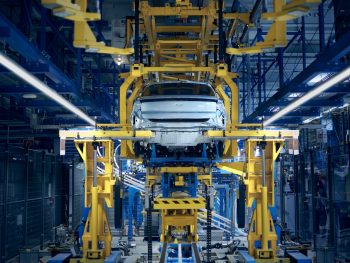Ford opens new plant in Cologne to build next-gen EVs
Ford has opened the doors to its new Cologne Electric Vehicle Center, which will be home to its new generation of electric vehicles.
The site, first founded in 1930, has been transformed with a $2bn (£1.6bn / €1.86bn) investment and will produce electric passenger vehicles for the European market.
The 125-hectare site is equipped with a brand-new production line, battery assembly and latest tooling and automation equipment. It will have an annual production capacity of 250,000 EVs, supporting the company’s global plans to reach a run rate of two million EVs annually by the end of 2026.
First to roll off the line will be the recently revealed electric Explorer – a two-row, five-seat midsize crossover that marks the brand’s fourth EV globally following the Mustang Mach-E, E-Transit and F-150 Lightning, but is actually built on the Volkswagen Group’s MEB platform under a global cooperation between the two firms.
The Explorer will be followed by a sports crossover, supporting plans to have an all-electric portfolio of passenger vehicles in Europe by 2030.
The new EV centre in Cologne will also be Ford’s first carbon-neutral assembly plant to open globally, in line with its commitment to reach carbon neutrality across its entire European footprint of facilities, logistics and direct suppliers by 2035.
“Opening the Cologne EV Center is the start of a new generation of clean manufacturing and electric vehicles in Europe,” said Bill Ford, executive chair. “This facility will now be one of the most efficient and environmentally responsible plants in the entire industry. I am thrilled to continue working toward a zero emissions future for our children and grandchildren.”
The new Explorer will become the latest iconic Ford to be produced at the site. Predecessors include the Ford Model A, Capri, Granada and Fiesta. Over its 90+-year history, the Cologne facility has produced more than 18 million cars.
Alongside its eco credentials, the Cologne EV Center also features latest digital advancements including self-learning machines, autonomous transport systems and the use of big data management in real time.
The site will also look to support its human workers, not replace them, using new cognitive and collaborative robots and augmented reality solutions that will increase efficiencies and data exchange with other plants to share experiences in real time.
“The Cologne EV Center signals the start of a new era for Ford in Europe,” said Martin Sander, general manager of Ford Model e in Europe. “We are once again redefining auto manufacturing, implementing advanced technologies to build fully connected, software-defined vehicles that meet our customers’ demand for zero-emission mobility.”



